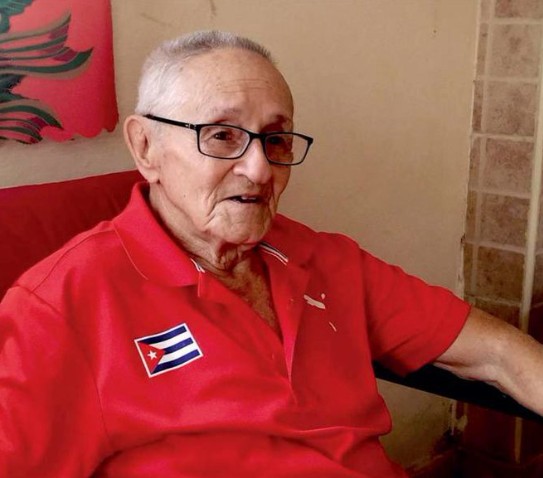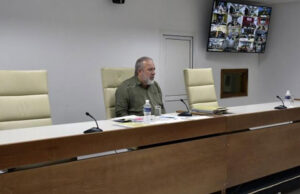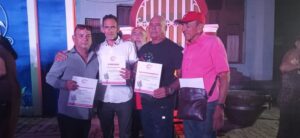«Ernesto González Campo, known affectionately as Palillo, whom I greeted at the recent meeting with the combatants, has died. Condolences to the family and friends of the outstanding revolutionary who maintained his rebellious spirit until the end of his life,» reported the First Secretary of the Party Central Committee Miguel Díaz-Canel Bermúdez on his X account.
The revolutionary fighter Ernesto González Campos (Palillo) died on Wednesday afternoon, April 2, at the age of 94. He was born in the village of Calabazar, in the then municipality of Santiago de las Vegas, today the municipality of Boyeros, on March 24, 1931, the son of a very humble family of working class origins.
He began his primary studies at the Calabazar School, up to the 6th grade, and did not continue because his parents could not afford the daily trip to Santiago de las Vegas.
At the age of 13 he started working as an apprentice shoemaker in Calabazar, while studying at a night school.
At the age of 16 he joined the Orthodox Youth, when Eduardo R. Chivás broke away from authenticism and created the Partido del Pueblo Cubano Ortodoxo. He participated in the activities of the Pedro Trigo cell, together with René Badía, Oscar Quintela, Pedro Gutiérrez and other sympathisers. He was entrusted with tasks related to the distribution of propaganda. In these activities he met Conchita Fernández, Pastorita Núñez, Pelayo Cuervo and comrade Fidel.
After the coup d’état of 10 March 1952, he joined Fidel in denouncing the tyrant Batista, and became involved in the preparations for the 26 July action.
He also took part, with Fidel and other young people, in the first and historic March of the Torches.
With Jesús Montané Oropesa, the Mateu brothers and Gabriel Gil, he made the journey to Santiago de Cuba for the assault on the Moncada Barracks, and after the failed military action, he managed to leave Santiago and reach Havana.
There he began the struggle for the release of his comrades arrested for their participation in these events, which led, with the help of the people, to the release of the Moncadistas, who later left for Mexico. Ernesto was among those designated by Fidel to remain in the country to prepare the conditions and continue the struggle for definitive independence.
He remained in hiding and supported the expeditionaries on the Granma yacht, and later the fighters of the Rebel Army.
After the triumph of 1 January 1959, he joined the National Revolutionary Militias; he took part in the fight against bandits in the Escambray, and fought the mercenary invaders on the sands of Playa Giron.
In 1962, he entered the workforce, initially as a textile industry regulator and later, for more than ten years, in the Merchant Navy.
A founder of the Communist Party of Cuba, he served for several terms as a delegate for his constituency, fulfilling this responsibility to the full and maintaining a permanent link with his constituents.
For his services to the country, he received numerous decorations and distinctions. He held the medals of Combatiente de la Lucha Clandestina; the commemorative medals for the 10th, 20th, 30th, 40th, 50th and 60th Anniversaries of the FAR, and the 50th Anniversary of the State Security Organs; the medals of Combatiente de Playa Girón and of the Fight against Bandits; as well as the 28th of September and the Martyrs of Barbados.
Ernesto González Campos stood out for his humility and simplicity, for his absolute loyalty to Fidel and Raúl, for his permanent defence of unity among revolutionaries, and for his dedication, until his last breath, to the tasks entrusted to him by the Revolution.
He forged close links with the people, with young people and, in particular, with the University Student Federation, accompanying them in their activities.
By decision of his family, his body will be cremated and his ashes will be deposited, next Friday, April 4th, at 10:00 a.m., in a military ceremony at the Pantheon of the Revolutionary Armed Forces.




